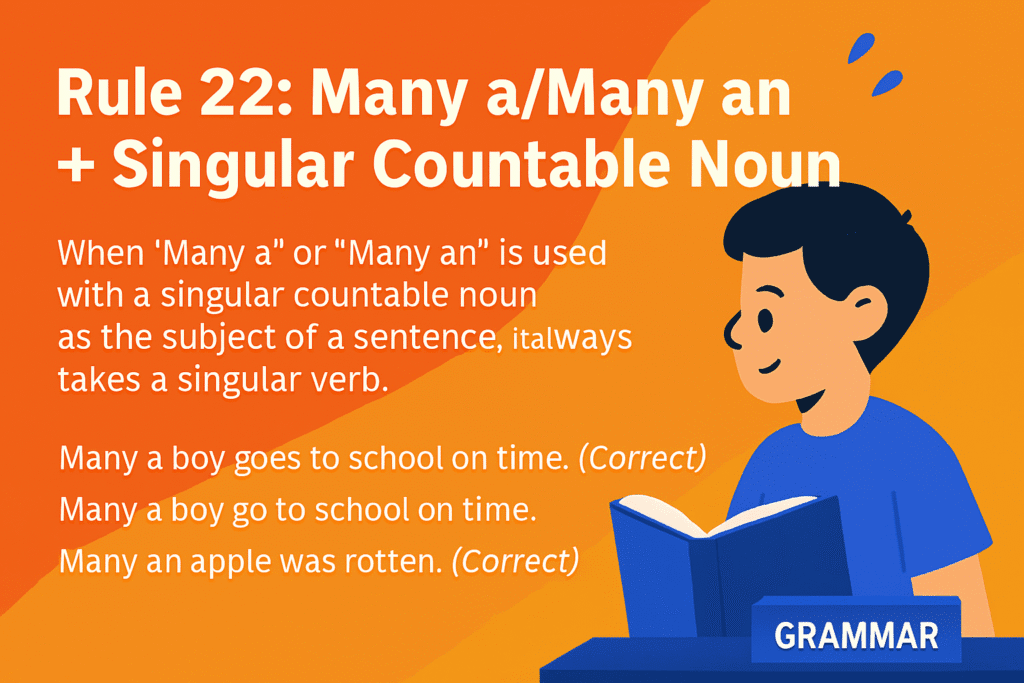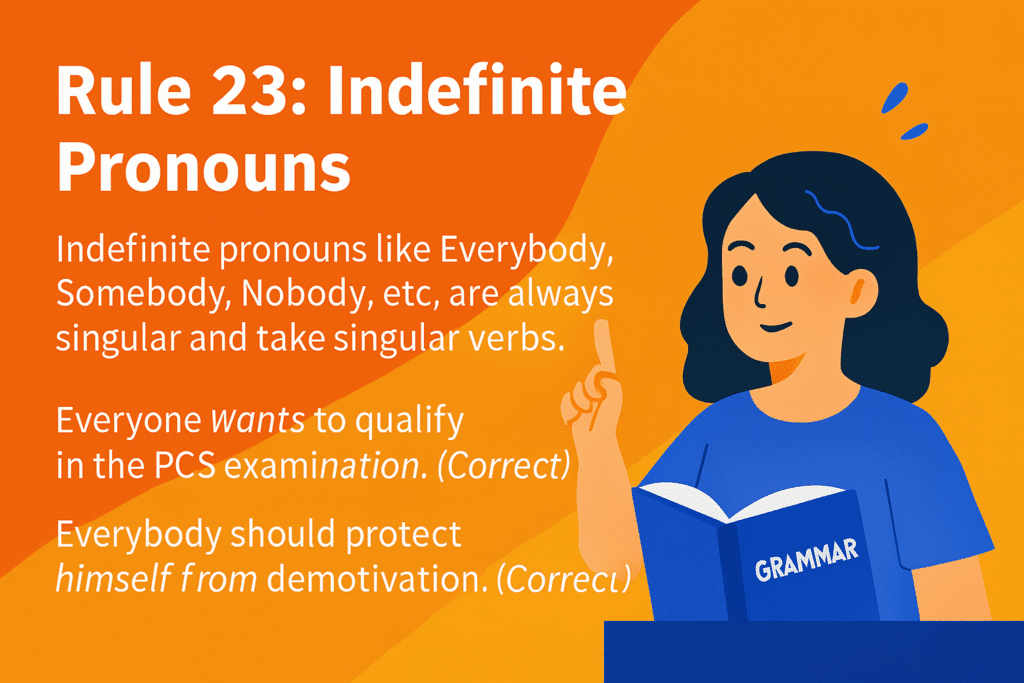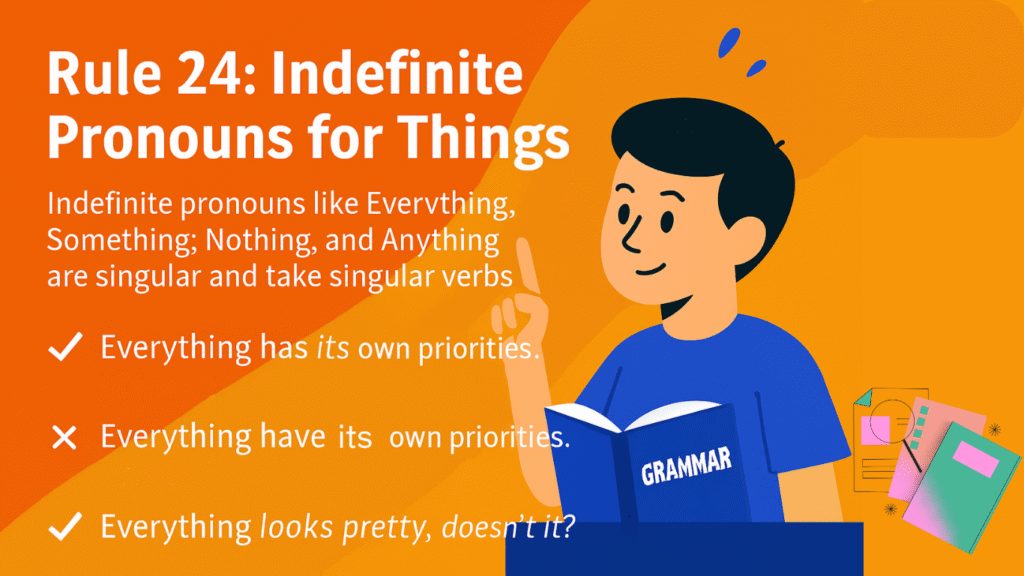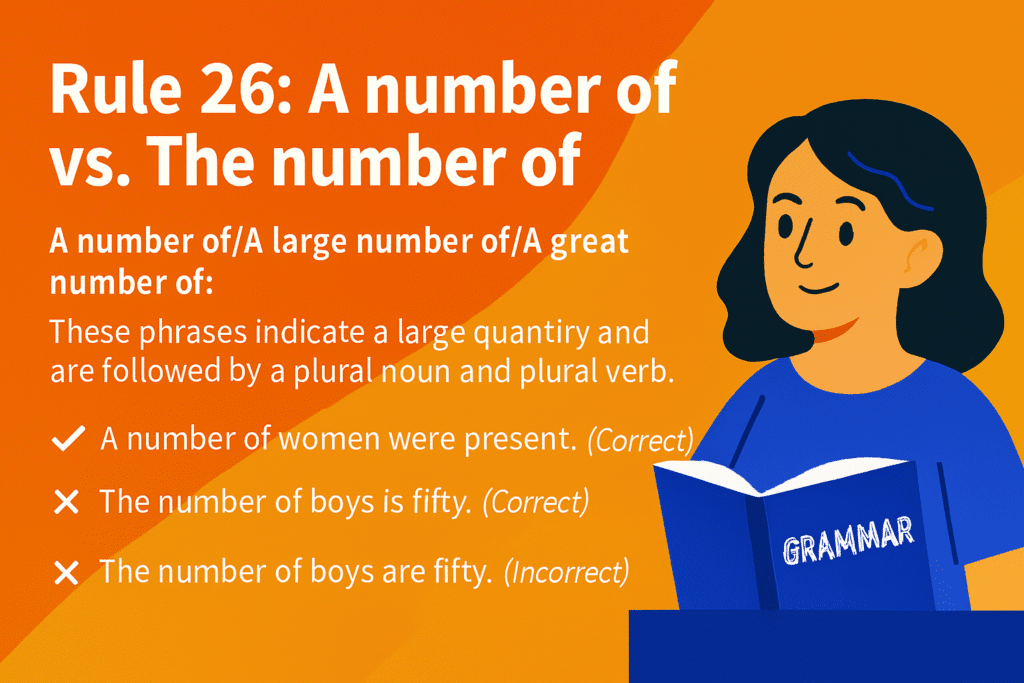
Are you preparing for competitive exams like PSSSB, PCS, Punjab Police, Punjab Patwari, or Excise Inspector? If yes, then mastering English grammar is a must! Grammar forms the backbone of the English language, and a strong grasp of it can help you score well in the language section of these exams. In this article, we’ll continue our series on essential English grammar rules, focusing on concepts that are frequently tested in competitive exams. If you haven’t read the previous article, click here to catch up before diving into this one.
Let’s explore some important grammar rules with examples to help you understand and apply them effectively.
Table of Contents
Rule 22: Many a/Many an + Singular Countable Noun

When “Many a” or “Many an” is used with a singular countable noun as the subject of a sentence, it always takes a singular verb. This might seem confusing because “many” implies plurality, but the verb must agree with the singular noun.
Examples:
- Many a boy goes to school on time. (Correct)
- Many a boy go to school on time. (Incorrect)
- Many an apple was rotten. (Correct)
- Many an apple were rotten. (Incorrect)
- Many a soldier fights bravely for the nation. (Correct)
- Many a soldier fight bravely for the nation. (Incorrect)
- Many an artist has struggled before achieving fame. (Correct)
- Many an artist have struggled before achieving fame. (Incorrect)
Rule 23: Indefinite Pronouns (Everybody, Somebody, Nobody, etc.)

Indefinite pronouns like Everybody, Somebody, Nobody, Anybody, Everyone, Someone, No one, and Anyone are used to refer to unspecified people or things. These pronouns are always singular and take singular verbs and singular pronouns (He, Him, His, Himself).
Key Points:
- Verb Agreement:
- Everyone wants to qualify in the PCS examination. (Correct)
- Everyone want to qualify in the PCS examination. (Incorrect)
- Pronoun Usage:
- Everybody should protect himself from demotivation. (Correct)
- Everybody should protect themselves from demotivation. (Incorrect)
- Everybody should love his city. (Correct)
- Everybody should love their city. (Incorrect)
- Exception in Question Tags:
- In question tags, use they instead of he.
- Everyone cannot help you, can they? (Correct)
- Everyone cannot help you, can he? (Incorrect)
- In question tags, use they instead of he.
Rule 24: Indefinite Pronouns for Things (Everything, Something, Nothing, etc.)

Indefinite pronouns like Everything, Something, Nothing, and Anything are used to refer to unspecified things. These pronouns are also singular and take singular verbs and singular pronouns (It, Its, Itself).
Key Points:
- Verb Agreement:
- Everything looks pretty itself. (Correct)
- Everything look pretty themselves. (Incorrect)
- Pronoun Usage:
- Everything has its own priorities. (Correct)
- Everything has their own priorities. (Incorrect)
- Exception in Question Tags:
- In question tags, use it instead of they.
- Everything looks pretty, doesn’t it? (Correct)
- Everything looks pretty, don’t they? (Incorrect)
- In question tags, use it instead of they.
Rule 25: Indefinite Pronoun – ‘One’

When the pronoun ‘One’ is used as the subject of a sentence, it takes a singular verb and is paired with singular pronouns (One, One’s, Oneself).
Examples:
- One was dishonest. (Correct)
- One should love one’s home. (Correct)
- One should love his home. (Incorrect)
- One should always do one’s duty. (Correct)
- One should always do his duty. (Incorrect)
- One must take care of oneself. (Correct)
- One must take care of himself. (Incorrect)
- If one works hard, one will succeed. (Correct)
- If one work hard, one will succeed. (Incorrect)
Rule 26: A number of vs. The number of (English Grammar Rule)

- A number of/A large number of/A great number of:
- These phrases indicate a large quantity and are followed by a plural noun and plural verb.
- A number of women were present. (Correct)
- A number of women was present. (Incorrect)
- These phrases indicate a large quantity and are followed by a plural noun and plural verb.
- The number of:
- This phrase refers to a specific quantity and is followed by a plural noun but takes a singular verb.
- The number of boys is fifty. (Correct)
- The number of boys are fifty. (Incorrect)
- This phrase refers to a specific quantity and is followed by a plural noun but takes a singular verb.
Mastering these English grammar rules is a significant step toward achieving success in competitive exams. By understanding and practicing these concepts, you’ll be able to tackle grammar-related questions with confidence. Remember, consistent practice is the key to improvement.
Let’s Practice!
Write your own sentences using the rules discussed above and share them in the comment box. This will help you reinforce your learning and identify areas for improvement. Don’t forget to share this article with your friends and fellow aspirants—let’s build a community of learners who support each other in achieving their goals.
FAQs
1. Why is grammar important for competitive exams?
Grammar is a fundamental part of the English language section in competitive exams. A strong grasp of grammar rules helps you answer questions accurately and improves your overall score.
2. How can I remember these grammar rules?
Practice is the best way to remember grammar rules. Write sentences using each rule, solve practice questions, and revise regularly.
3. Are these rules applicable only to competitive exams?
No, these rules are essential for everyday English communication as well. Mastering them will improve your writing and speaking skills.
4. What should I do if I make mistakes while practicing?
Mistakes are a natural part of learning. Review your errors, understand the correct usage, and practice again.
5. Can I use “they” with “Everybody” in formal writing?
Traditionally, “Everybody” is paired with singular pronouns like “he” or “his.” However, in modern usage, “they” is increasingly accepted as a gender-neutral alternative.
6. What is the difference between “Many a” and “Many”?
“Many a” is followed by a singular noun and takes a singular verb (e.g., “Many a student has passed the exam”).
“Many” is followed by a plural noun and takes a plural verb (e.g., “Many students have passed the exam”).
7. Can I use “Their” with “Everyone” in spoken English?
While traditional grammar rules require “Everyone” to be paired with singular pronouns like “his” or “her,” the use of “their” as a gender-neutral pronoun is widely accepted in spoken and informal English. For example, “Everyone should bring their notebook” is commonly used.
8. Why does “The number of” take a singular verb?
“The number of” refers to a specific quantity or count, which is treated as a single unit. For example, “The number of candidates is increasing” focuses on the total count as one figure, hence the singular verb.
9. How do I know when to use “Its” vs. “It’s”?
“Its” is a possessive pronoun (e.g., “The cat licked its paws”).
“It’s” is a contraction of “it is” or “it has” (e.g., “It’s raining” or “It’s been a long day”).
10. Are there any exceptions to the rules for Indefinite Pronouns?
Generally, Indefinite Pronouns like “Everyone,” “Something,” and “Nobody” follow the rules mentioned. However, in informal contexts, especially in spoken English, some flexibility is allowed (e.g., using “they” with “Everyone”). For competitive exams, stick to the traditional rules unless specified otherwise.


















